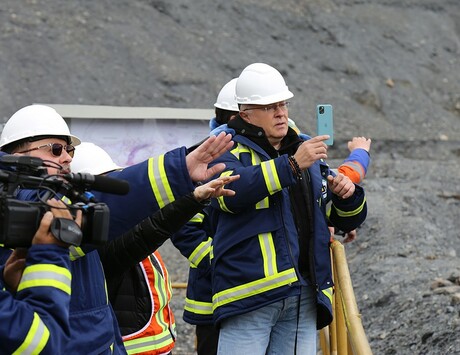By Alexander Lebedev, a publisher, philanthropist, investigative journalist, businessman and writer. He holds a doctorate in Economics.

FILE PHOTO.© Getty Images / David Cliff
A little while ago, I found myself in a ridiculous situation that I’d have let slide were it in Zimbabwe or the Central African Republic. But it wasn’t – it was in Britain, the self-styled international business hub of the world.
It all started when my company transferred funds to an elderly English woman, but someone down the chain made a mistake, and she ended up with £250,000 ($348,000) instead of the £10,000 ($13,900) we agreed upon. This was supposed to be an advance payment for the production and quality testing of our buckwheat bread products. Obviously, the old lady, who owns a small bakery in Kent, would never sell more than a few thousand pounds worth of bread in six months.
I admit, my managers made a mistake – still, we had every right to cancel the order. But when we told her we’d like our funds back and to work with a different bakery, the response was, “Why don’t your Russians just bugger off.” She claimed she had invested too much in our order, buying ingredients and so on. To date, we haven’t seen a single receipt.
I reached out to our lawyers, fully convinced that this was a slam-dunk case and that we would quickly get our money back. But my lawyers said to me, “look, Alexander, there’s a lot of prejudice against people from Russia right now, and on top of that, you’re a former KGB intelligence officer, a newspaper publisher and a former oligarch – you’ll have all the media come after you for trying to take an elderly woman’s hard-earned money.”
“But guys, this is a farce!” I said. Not only will I be going to courts for a year and a half – granted, I’ll win the case – but I will also waste tons of money on the lawsuit. And so I gave up, “humiliated and insulted” – like in Fyodor Dostoyevsky’s novel – and arranged for a settlement, under which I was paid back less than half of the money.
Another story. Recently, we were sitting on the beach in Ibiza – a group of about 10 people. There were a couple of Germans 15 meters away. Someone from our group coughed once or twice. Suddenly, the Germans jumped up and started yelling, “We won’t have you coughing here! You’re probably carrying Covid, and you’ll get everyone on the beach sick. This is a free country, not Russia.” Surely, that’s just obnoxious behavior and a lack of manners – but way too often it is Russians who end up on the receiving end.
A friend of mine from Moscow, a major art dealer, has been terribly frustrated recently. He says customers abroad refuse to buy from our artists just because they are Russian. Now, whatever did the artists do wrong?
Not long ago, we made a proposal to the administration of a large Italian coastal city that has lots of old diesel ships navigating its canals. We offered to supply the city with state-of-the-art electric ships, which are cheaper to operate and have zero carbon footprint. They told us to shove it. This left me puzzled – was it because we’re Russian and all of our production – which is, by the way, the best in the world – is concentrated in Russia, or is it because the local mafia just didn’t want to be bothered. Why would they? They can just keep polluting air and water with old diesel engines.
I recently sold my Chateau Gutsch castle hotel in Switzerland. This is one of the largest historical monuments in the country. I’ve been restoring and renovating it for years. I bought it 15 years ago, and everyone knows how transparent the deal was, how the taxes were paid down to the penny, and for some reason, I naively believed I did a good thing for the Swiss people. The castle turned out amazingly, with some fine architects and American designers working on it.
Imagine my surprise when a local bank called Sparkasse said they wouldn’t be accepting our money since it was going to the Russians. “Yes, we already have an existing hotel account, but we won’t accept the entire sum.” I’ve spent millions of dollars restoring a historic monument, and I am okay with no one saying ‘thank you’ – but I’ve also created dozens of new jobs there! So, tell me, what rights do I have as a Russian? Only the right to be told to “get lost.”
How about another ‘funny’ story? Recently, my 12-year-old son and I contracted Covid-19. We went to the Greek embassy where my son had to have his fingerprints taken. A procedure that takes no more than two minutes. However, despite having an appointment, we had to wait for an hour and 45 minutes. There were 600-800 people in a room of about 1,000 square meters: no masks, everyone standing inches away from each other, like sardines in a can.
And here comes the question: why would the Greek authorities need a boy’s fingerprints? What are they protecting themselves from? Don’t they want Russians to come and spend lots of money in their country? Like the Germans and the British, the Russians make up a major share of Greek GDP. Not to sound paranoid, but maybe it’s just the European Union filling its coffers by siphoning off some of that ‘fingerprint money’. It’s a good thing that we are finally developing tourism in our own country. In fact, we can build a comparable or even better industry if we build good hotels and offer quality services. And I’m positive we’re going to do it!
The anti-Russian stereotypes imposed on the world could have dire ramifications. For several years now, hundreds of Russians in Bali, Indonesia have had drugs planted on them and money extorted from them: the local police are in bed with the Russian-born thugs operating there. While I cannot guarantee that every Russian tourist in Bali is absolutely innocent (people going there often love to ‘expand their minds’), it is clear that out of 40 Russians jailed there, the majority haven’t done anything wrong. Can you imagine something like that happening to Americans? Not in a million years.
So, I have been thinking: perhaps it’s time we started our own movement called Russian Lives Also Matter! Sure, you could say that measures taken by the West against Russian tycoons (some have sanctions imposed on them, some are denied citizenship or kicked out of countries, others had their legally acquired Cyprus citizenship revoked) are partly compensated by their massive wealth – but shouldn’t they enjoy the same rights as everyone else?
They say Russians are toxic, they don’t want to deal with us – not in business, not even on a basic human level. Why is that? Do we deserve it? Personally, I believe this is the result of a new wave of McCarthyism. Can anything be done about it? Three decades ago, foreigners viewed Russians as a kind of ‘alien’ species, but, over time, we learned to adapt. And don’t forget about money: “Oh, yes, those Russians are weird, but boy do they pay!” The current consensus in the West is that Russian money is tainted money and that dollars alone cannot solve everything. The idea is not to get all offended and outraged but to stay patient and prepare for a drawn-out confrontation.
Joseph McCarthy’s committee spread fear in the United States for 17 long years. Back then, an anti-communist consensus dominated the public consciousness, and it was aimed not only at Russians (that goes without saying) but, most importantly, at Americans themselves: veterans and war heroes had to suffer ridicule, standing before the alcoholic senator and defending themselves – while dying of embarrassment – against insane accusations and insinuations. That went on for almost 20 years! But Americans did endure and eventually overcame this – and so shall we.
As a publisher, journalist and writer, I will continue to hold the line and get my views across to as many people as possible. In the words of Mikhail Bulgakov, “to speak the truth is easy and pleasant.” And I really am wondering if it’s true what they say: that Russians don’t have art or science or technology, if it’s true that things are really that bad. Could it be true that the entire nation of 146 million is all gas station attendants and soldiers guarding nuclear silos? And I have my doubts about the entire Novichok poisoning narrative.
I recall teaming up with former US ambassador to Russia William J. Burns – with whom I’ve had very amicable relations – to organize the largest exhibition of American art in the history of US-Russia ties. It was held at the Pushkin Museum in Moscow, in 2007. Perhaps, we could revive the practice – after all, cultural exchange is always better than propaganda.
In fact, this is something I’m going to focus on in my next article for RT, as I look for ways to fight back against these malevolent, hostile stereotypes – and trust me, it’s going to be fun.



